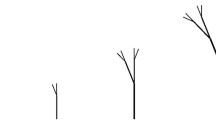Abstract
Membrane Computing (MC) is part of the powerful trend in computer science known under the name of Natural Computing. Its goal is to abstract computing models from the structure and the functioning of the living cell. The present paper is a short and informal introduction to MC, presenting the basic ideas, the central (types of) results, and the main directions of research.
Access this chapter
Tax calculation will be finalised at checkout
Purchases are for personal use only
Preview
Unable to display preview. Download preview PDF.
Similar content being viewed by others
References
Alberts, B., Johnson, A., Lewis, J., Raff, M., Roberts, K., Walter, P.: Molecular Biology of the Cell, vol. 4. Garland Science, New York (2002)
Bray, D.: Protein Molecules as Computational Elements in Living Cells. Nature 376, 307–312 (1995)
Ji, S.: The Cell as the Smallest DNA–Based Molecular Computer. BioSystems 52, 123–133 (1999)
Păun, G.: Computing with Membranes. Journal of Computer and System Sciences 61(1), 108–143 (2000); And Turku Center for Computer Science–TUCS Report 208 (November 1998), http://www.tucs.fi
Păun, G.: Computing with Membranes: An Introduction. Springer, Berlin (2002)
Pérez–Jiménez, M., Romero–Jiménez, A., Sancho–Caparrini, F.: Teoría de la Complejidad en Modelos de Computatión Celular con Membranas, Kronos, Sevilla (2002)
Sosik, P.: The Computational Power of Cell Division in P Systems: Beating Down Parallel Computers? Natural Computing 2(3), 287–298 (2003)
Tomita, M.: Whole–Cell Simulation: A Grand Challenge of the 21st Century. Trends in Biotechnology 19, 205–210 (2001)
Author information
Authors and Affiliations
Editor information
Editors and Affiliations
Rights and permissions
Copyright information
© 2005 Springer-Verlag Berlin Heidelberg
About this paper
Cite this paper
Păun, G. (2005). Membrane Systems: A Quick Introduction. In: Banâtre, JP., Fradet, P., Giavitto, JL., Michel, O. (eds) Unconventional Programming Paradigms. UPP 2004. Lecture Notes in Computer Science, vol 3566. Springer, Berlin, Heidelberg. https://doi.org/10.1007/11527800_15
Download citation
DOI: https://doi.org/10.1007/11527800_15
Publisher Name: Springer, Berlin, Heidelberg
Print ISBN: 978-3-540-27884-9
Online ISBN: 978-3-540-31482-0
eBook Packages: Computer ScienceComputer Science (R0)




